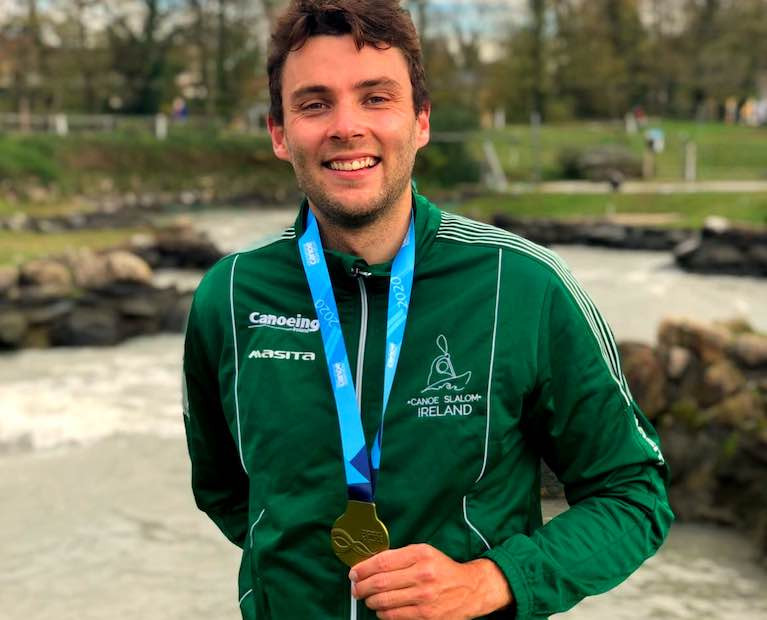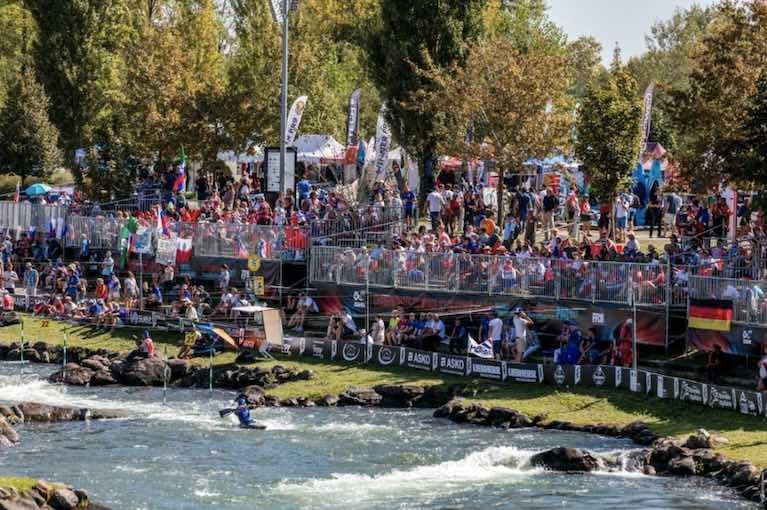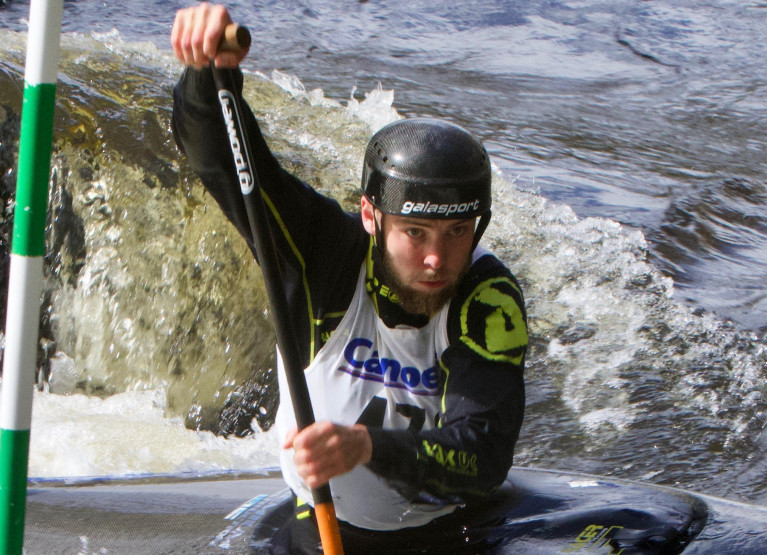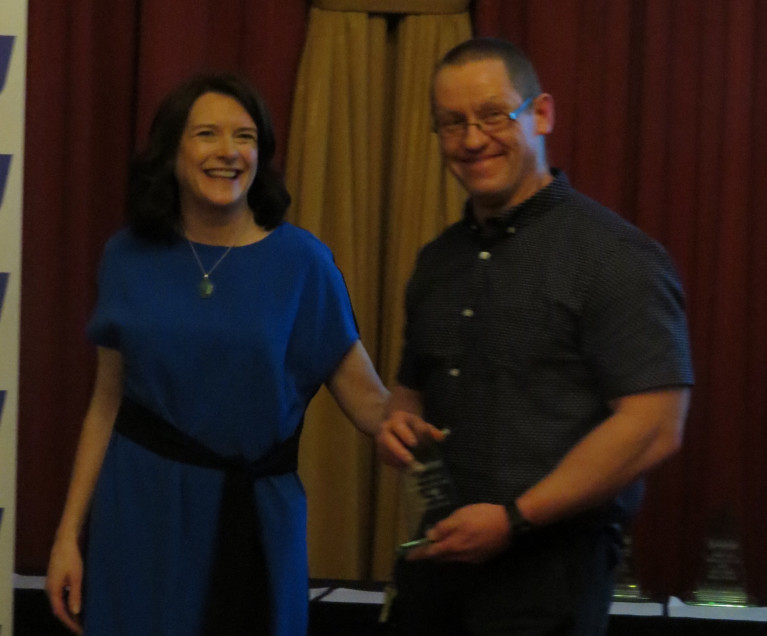Displaying items by tag: Liam Jegou
The Irish canoe slalom team had one of its strongest outings of the year in the fourth round of the Canoe Slalom World Cup in Pau, France — the first race back after the World Championships at the end of July.
In the qualification round on Friday (26 August), four out of five athletes qualified through to the semi-finals, including Samuel Curtis in the K1 Men appearing in his first semi-final of the season, and all 3 C1 men, continuing their impressive form in 2022 thus far.
In the C1 Men semi-final itself was Liam Jegou who rose most highly to the occasion, putting in a measured performance on a tight and technical course to qualify through to the 10-boat final in ninth.
Jake Cochrane showed some promising pace with only a two-second penalty incurred on his run keeping him out of the final.
The C1 Men final was packed with the heaviest hitters in the category, with every athlete in the final being an Olympic, World or European medallist.
Going off second in the final, Liam had a great opportunity to lay down a marker to pressure the rest of the field. The Tokyo Olympian did exactly that, improving his time from the semi-final by two seconds in a great display of racing.
The class of the field became clear though, with Liam slipping out of contention for the medals to eventually finish in sixth, his best result of the season. Local favourite Denis Gargaud Chanut claimed his second consecutive gold.
Next week the Irish team will compete in the World Cup Final in La Seu D’Urgell, Spain where double points will be awarded, meaning there could be some big reshuffling in the overall standings.
Results
- C1 Men: Liam Jegou, 6th Final; Jake Cochrane, 16th; Robert Hendrick, 29th Semi-final.
- K1 Men: Samuel Curtis; 38th Semi-final; Alistair McCreery, 48th Qualification.
- Extreme Slalom: Alistair McCreery 22nd, Heats.
Canoeist Liam Jegou Ends Tokyo Olympic Bid in 15th Overall After Two Semi Final Time Penalties
There was a heart-breaking end to canoeist Liam Jegou’s quest for a Tokyo medal, finishing 15th in the Semi-final and not progressing to the Olympic Final.
A fantastic start to his racing was cut short with the tiny margins in Canoe Slalom, incurring two 50 second time penalties and dropping down the results list.
It turned out to be an extremely difficult morning for Jegou. Having recovered from a stressful day in the heats, Liam was off to a great start in his semi-final race, posting the fastest times on the top 2 splits as he powered his way down the course in a very composed display of racing. As he neared the bottom of the course the tiny margins in Canoe Slalom became clear as he barely misjudged the next gate in the sequence, diving to get his head between the poles but incurring a 50-second penalty, throwing him off balance and too far from the next gate to complete it correctly, ultimately ending his Olympic Games.
Speaking about the race Liam said – "Maybe I had the final already in my sights, and you can't be doing that"
His form coming into these Games was clear, with a sixth place in the Final of the World Cup in Germany before flying to Tokyo. With the momentum from this, the plan was for not just a final but potentially a medal, making this result all the more difficult to take.
"I've been working really really hard for that final run and to get a chance to fight for an Olympic medal"
Jegou now turns his sights to the World Championships later this year in Slovakia.
Liam Jegou has qualified through to the semi-final of the Tokyo 2020 Olympics in the C1 Men category.
This morning's heats provided some serious challenges for the field with Liam proving no exception to this.
As Afloat reported earlier, the Irish star incurred a 50-second penalty on his first run, leaving him at the bottom of the results with everything to do in the second run.
Liam put down a solid and composed run of 104.4 seconds including a 2-second penalty to see him safely through to tomorrow's semi-final.
With athletes having only one run in the semi-final it is wide open, with the medals being decided later tomorrow in the final.
Ireland canoeist Liam Jegou has had mixed results this season, but he flies to Tokyo on Monday buoyed by a good showing at the recent World Cup in Leipzig.
Sixth place in Germany sets him up nicely for the Olympic Games – particularly since the competition for the C1 paddler in Tokyo is set to be less testing than he is used to in World Cups and the World Championships.
“I feel pretty good. I had a few complicated races at the beginning of the season because I was training through them in order to peak for the Games this summer,” he says.
“So, the fact that last week in Leipzig I managed to put down a really good performance in the finals really boosted my confidence.
“It came at the right time, when I needed it. I’m feeling pretty confident in the way I’m paddling. I’m ready to show what I’ve got in Tokyo.”
Only 17 will compete in the C1 (Canadian canoe) in Tokyo, a very different scenario to the big numbers in World Championships and World Cups – 41 started at the World Cup in Markkleeberg, near Leipzig, with multiple entries from big powers like France and Slovakia. And some of the top men will not be going to Tokyo. The reigning Olympic champion, Denis Gargaud Chanut of France, won in Leipzig but did not make it through France trials.
“The Olympics is quite special in that regard in canoe slalom, because we only have the best of each nation there representing their country. At the World Championships you have three Slovaks, three French, three British. [The Olympic rules] narrow down the field [but] the guys that are there are the best in their nations.
"I’m feeling pretty confident in the way I’m paddling. I’m ready to show what I’ve got in Tokyo"
“So the Olympic champion is not going to the Olympics, but he was beaten by someone else [Martin Thomas] and that someone else is a very good paddler and he will be up there for a spot on the podium. The same with the Slovaks and all the [other] bigger nations.
“There are less people, but all the people that are there won very difficult selection [races] to qualify for the Games.”
One of the big challenges for most competitors will be heat in Tokyo in high summer. Jegou feels he is well prepared.
“It will be quite difficult. I have raced in the heat before; I raced in Rio, which was very warm. I was very lucky to be able to go to a training camp in February of this year on Réunion island. The temperature and the humidity was similar to what we are expecting in Tokyo.
 Liam Jegou - a really good performance in the finals in Leipzig has really boosted his confidence
Liam Jegou - a really good performance in the finals in Leipzig has really boosted his confidence
“I’m not too worried about it. I think we are very lucky [as competitors] in canoe slalom, [the heat] doesn’t affect us as much as some of the other athletes that aren’t in water.
“The measures we are taking are to stay out of the sun as much as we can, stay hydrated, [use] cooling vests and ice packs in the evening. I’m not too stressed about the heat.”
Jegou, who is 25, grew up in Clare, with a French father and Irish mother who moved back to France when he was a child of seven. However, he retained his sense of being Irish – and his accent. He is now based in Pau in France where he is coached by Nico Peschier. The arrangement owes a lot to another Irishman based abroad.
Mike Corcoran, who has lived in the United States for many years, was the last Irishman to race in the Olympics in the C1: he finished 12th in Barcelona in 1992 and 10th in Atlanta in 1996.
He sponsors Jegou, and stays in contact.
“Without him it would be much more difficult to qualify for the Games and to have gotten the results I have gotten,” Jegou explains.
“I know him well. I’m on the phone to him regularly. It’s great to have Mike on board with the team and to hear of his experience of the Games. It’s been brilliant and it’s a huge opportunity for me.”
“Mike talks a lot about enjoying the race, just doing your best and not focusing on the others. That really works for me – not worrying about who’s doing what, just making sure I’m doing my best run.”
Corcoran advises him not to take it too seriously.
“Be serious in training, but when you’re racing you’re there for the fun. Even though it takes a huge amount of time – and, I wouldn’t say, sacrifice – a huge investment, not to forget that when you’re racing you’re doing it because you love it and because it’s fun.”
As a lot of Irish fans may find in the next few weeks, slalom canoeing is a good watch. One of the selling points is that tiny margins – a touch on a gate (they hang down over the course), or a misjudgment of the flow of the charging water can be the difference between a medal or nothing at all.
"Jegou welcomes the help of a sports psychologist"
Being psychologically strong – willing to embrace risk knowing it may end in failure – is crucial to success, and Jegou welcomes the help of a sports psychologist.
“It’s a huge part of the sport. You can be as [good] physically, technically, as you want [but] if on the day you’re stressed out, you’re too tense and you push too far on your knee or you are too close to a gate it is over.
“So, it’s a huge aspect, a huge part of the sport. And any mistake in canoe slalom is very expensive. So, it’s a huge part of my training.”
He is very thankful for the backing of Canoeing Ireland, Sport Ireland the Olympic Federation and his frame of mind going to Tokyo is good.
The lift of making the final in Leipzig was even greater because he finished just under two seconds short of a bronze medal – he had three touches on gates, each cost two seconds. Two touches and he would have been on the podium.
This was all the sweeter as his most dispiriting result had come in the previous event – he missed out on even making the semi-final at the World Cup in Prague.
“So in Markkleeberg, having spent a pretty bad week after the World Cup in Prague, with a lot of self doubt, I was really proud to turn it around and put down three really good runs: to qualify for the semis, and then in the semis a solid run to qualify for the finals, and then in the finals I paddled the way I wanted to paddle. I took a lot of risks, I cut some lines, picked up a few unfortunate touches and [was] a touch away from a medal.
“So, a really big confidence boost for myself. I proved to myself that I have what it took and I can do it.
“It came at the right time!”
On Monday he departs for Tokyo. Three more good runs and the podium could be in his sights.
Ireland's Liam Jegou Shows Tokyo Promise at Canoe Slalom World Cup Race in Markkleeberg
After a difficult race at the first World Cup round in Prague, Team Ireland canoeists lined up again in Germany for the next World Cup. As the last major race before this summer's Olympic Games, it was an essential benchmark for Liam Jegou to test his form in the C1 Men before getting on the plane to Tokyo.
After a solid performance in the qualification round to progress through to the semi-final, Liam opened up in the semis to qualify through to the finals in 7th. Showing some great attacking racing which we can look forward to in Tokyo, Liam went on to finish 6th in the final, incurring time penalties down the course, which kept him from a spot on the podium. This significant marker of raw pace is a perfect boost of momentum heading into the Olympics, with the stage being set for an excellent result for the Irish paddler.
 Jake Cochrane in action in the C1 Men
Jake Cochrane in action in the C1 Men
Also racing in the C1 Men, Jake Cochrane emphasised his current good form making his second consecutive semi-final, finishing eventually in 28th. In the C1 Women, Michaela Corcoran, daughter of Irish Canoeing Olympian Mike Corcoran, made her first-ever Senior Semi-final, finishing in 23rd. For the Irish K1 team, it was another difficult weekend of racing, with Noel Hendrick and Alistair McCreery missing out
Tokyo Olympic Canoeist Liam Jegou Third in Réunion Training Race
Tokyo Olympic canoeist Liam Jegou is on Réunion Island in the Indian Ocean on a warm-weather training camp, with many Tokyo Olympians (and hopeful qualifiers) from around Europe.
Last weekend a small international race was held for the athletes training on the course.
Jegou came away with third in this race, competing against a lot of the same athletes he will be lining up against in Tokyo in July.
Tokyo 2021 Confirmed Canoe Slalom Olympian Liam Jegou In World Cup Race This Weekend
This weekend will see Canoe Slalom athletes compete behind closed doors at a World Cup race in Pau, France, where London 2012 Olympian Hannah Craig, and Tokyo 2021 confirmed Olympian Liam Jegou will both be racing for Ireland.
After the massive COVID disruptions for the International canoe slalom community this season, getting the opportunity to once again paddle on the magnificent Pau course will be a moment to savour this weekend and a return to the international circuit.
A few days after having hosted the selections for the composition of the French team for the next Olympic Games (from October 7 to 11), the White Water Stadium will once again be the stage of spectacular women’s and men’s races in slalom and extreme slalom.
Canoe Slalom
Canoe Slalom is an Olympic discipline which consists in doing a wild water course almost 400 metres in length as quickly as possible whilst respecting a mandatory route, indicated by gates (18 to 25 maximum). There are two types of gate:
- Green gates: passed through heading downstream
- Red gates: negotiated heading upstream
Gates which the canoer touches, or those that are not crossed, are counted as penalties, which add to the finishing time of the course (2 seconds for a touch, 50 seconds for a missed gate).
International categories
- Men’s kayak single (MK1) and women’s kayak single (WK1)
- Men’s canoe single (MC1) and women’s canoe single (WC1)
- Men’s Extreme Canoe Slalom (MCSLX) and Women’s Extreme Canoe Slalom (WCSLX)
Courses involving team events with three boats also exist.
Canoe Slalom is practised on more or less complicated whitewater courses depending on the level of the competition, with a qualifying phase of two rounds followed by a semi-final and a final round.
Canoe Slalom racer Liam Jegou has become the first Team Ireland athlete to be selected for the Tokyo Olympic Games this summer. Originally from Ballyvaughan, Co. Clare, the France-based Jegou has already stamped his mark on the international stage, winning silver in the 2014 Junior World Championships and bronze in the 2019 U23 World Championships. The 24-year-old will compete in the C1 category at the Kasai Canoe Slalom Centre in Tokyo from the 26-27 July 2020.
Jegou is the second Irish athlete ever to compete in the C1 Canoe Slalom at the Olympic Games, with the only other athlete being Mike Corcoran, who last competed in Atlanta 1996, the year in which Jegou was born.
Jegou said he was intent on seizing his opportunity in Tokyo. “Being an Olympian has always been one of my biggest dreams. I started training when I was 11 or 12, the past month has been unbelievable knowing that I am going to compete for Team Ireland in the Olympics.
“In my sport the Olympics is everything, it’s what everyone works for in their sport. It’s such a select thing; there’s only one athlete per nation that gets to go and when you to go you just want to give it your all. Most people only get to go to the Games once or twice in their lives, and I’m certainly not going to let the opportunity pass me.”
Olympic Federation of Ireland Chef de Mission for Tokyo 2020, Tricia Heberle said: “It’s very exciting, this is our first athlete to be approved as part of Team Ireland for the 2020 Olympics – it’s great for the sport and great for Liam.
“There is a tremendous amount of work that goes on behind the scenes to support sports and our athletes to qualify and perform at the Games. It’s a real team effort with our National Federations, the Sport Ireland Institute and a range of other support groups working together with the athletes as our priority. Liam has his own story and we are so pleased to be supporting the next chapter in his journey as he prepares for the Tokyo Olympic Games.”
Canoeing Ireland Performance Director Jon Mackey described the significance of this for his sport: It’s big for any sport to qualify for an Olympic Games. For canoeing, it’s great for the exposure of the sport, we are relatively small, and it’s great to tap into the proud tradition of Irish canoeing at the Olympic Games.”
Jegou was nominated for the 2020 slot after finishing on top in the three-race selection criteria, which included the World Championships in Spain, the event in which Ireland qualified the coveted Olympic berth courtesy of Robert Hendrick.
The difference between C1 and K1 in Canoeing is that the C1 category involves the athletes using a single-bladed paddle to propel the boat forward while kneeling in the canoe. The K1 athlete is seated and uses a double bladed paddle. C1 Canoe Slalom has been on the Olympic programme since 1992 as a men’s event, and 2020 is the first year that a C1 women’s event is included, in the IOC move towards a gender-balanced games.
Ireland has a rich history in K1 Canoe Slalom, with Ian Wiley and Eoin Rheinisch competing in the event for three Olympic Games each between 1992 and 2012. Eadaoin Ní Challarain was the first Irish female canoe slalom racer, competing in the K1 in 2000 and 2004, and in London 2012 Hannah Craig raced in this event also.
This is the first official Team Ireland Tokyo team announcement. Many sports have ongoing selections and competitions with team announcements expected to come more frequently as we approach the summer, with the final announcement scheduled for the beginning of July.
Canoe Awards Gala Honours Stars and Long-Time Mentor
The Canoeing Ireland Awards Gala on Saturday night, which marked achievements in the sport in 2019, had plenty to celebrate. Liam Jegou, who will represent Ireland in canoe slalom at the Tokyo Olympics and Robert Hendrick, who qualified the boat, were both honoured.
Paralympian Patrick O’Leary, who also qualfied for Tokyo, was presented with his award by Miriam Malone, the chief executive of Paralympics Ireland. Malone and Karen Coventry of Special Olympics Ireland were keynote speakers at the event in the Spa Hotel.
The roll of honour on the night was long: Jenny Egan was chosen as best senior female paddler of the year in both canoe marathon and canoe sprint; Peter Egan was the chosen senior male in marathon canoeing. The senior Freestyle winners were Aoife Hanrahan and David McClure; Aisling Griffin and Michael Barry took the honours in the Paddle Surf category; Ciara Gurhy and Oisin McKay took the Canoe Polo honours. In the Wild Water category Odhran McNally (kayak) and Darragh Clarke (canoe) were honoured.
Oisin Feery, who starred for Ireland at the Special Olympics World Games in Abu Dhabi, won the Special Achievement award; the Event of the Year was Meelick Riverfest; the Team of the Year, the Ireland under-21 women’s Canoe Polo team. The Community Impact prize went to McMahon Cup.
The Volunteer of the Year award went to a man behind many of the medals won by Ireland in Canoe Marathon and Canoe Sprint, the indefatigable Tom Egan.
Jegou Nominated to Represent Ireland at the Olympic Games
#Canoeing: Liam Jegou has been nominated by Canoeing Ireland to represent Ireland at the Olympic Games in Tokyo next year. Jegou won the selection event for the C1 at the British Open. The boat had been qualified by Robert Hendrick at the canoe slalom World Championships. The selection will be confirmed once the Olympic Federation of Ireland makes the announcement.



























































